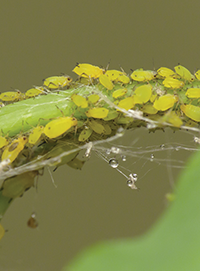Watch for Soybean Aphids
How the soybean aphid became the most serious pest threat to soybean producers and how to fight it.
How the soybean aphid became the most serious pest threat to soybean producers and how to fight it.

By Kevin Johnson, Field Scientist, Corteva Agriscience
Since 2000, when it was discovered in the Midwest, the soybean aphid has quickly become the most serious pest threat to soybean producers. The soybean aphid uses sucking needlelike mouthparts to feed on plant juices.
In large numbers, soybean aphids can reduce plant vigor and growth. Visual signs of soybean aphid damage may include leaf puckering as well as reduced pod and seed counts.
Damage severity varies widely depending on pressure. It can be exacerbated by other stressors on the soybean plant, especially during drought conditions. Soybean aphids are most likely to appear during the primary soybean reproductive growth stages, typically from June through August in the Midwest.
In favorable conditions, aphid populations can proliferate quickly. Aphid movement is often sporadic and difficult to predict, so diligent scouting is important. Consider the following scouting tips:
Transform® WG insecticide from Corteva Agriscience is proven effective for controlling soybean aphids. Transform is a distinctive new chemistry with a unique mode of action that controls pests that might be resistant to other insecticides.
Once producers spray plants, the foliar-applied translaminar activity of Transform moves from the surface to the inside of the leaf where it will move within to protect the entire treated leaf. Transform provides superior control of soybean aphids via direct contact and ingestion.
In addition to excellent control and proven residual, one of the biggest advantages of Transform is the minimal impact of the chemistry on beneficial insects when compared with pyrethroids and other classes of insecticide products. When applied as directed, Transform® WG insecticide allows predatory insect populations to remain intact to control spider mites.
The superior control of Transform at a low use rate (0.75 ounce per acre) makes it a cost-effective treatment control option for growers. Transform also is tank-mix-compatible with most commonly used crop protection products: nutrients, adjuvants, herbicides and fungicides.
For more information about Transform, visit TransformMySoybeans.com or talk with your Corteva Agriscience sales representative.
Transform WG is not registered for sale or use in all states. Contact your state pesticide regulatory agency to determine if a product is registered for sale or use in your state. Always read and follow label directions.